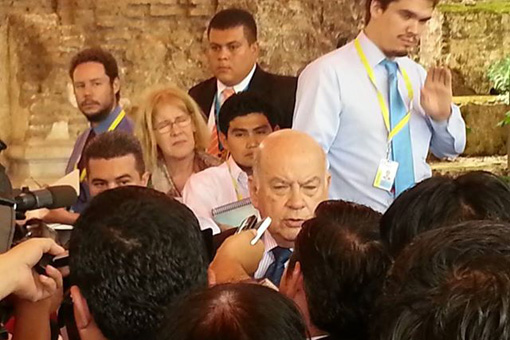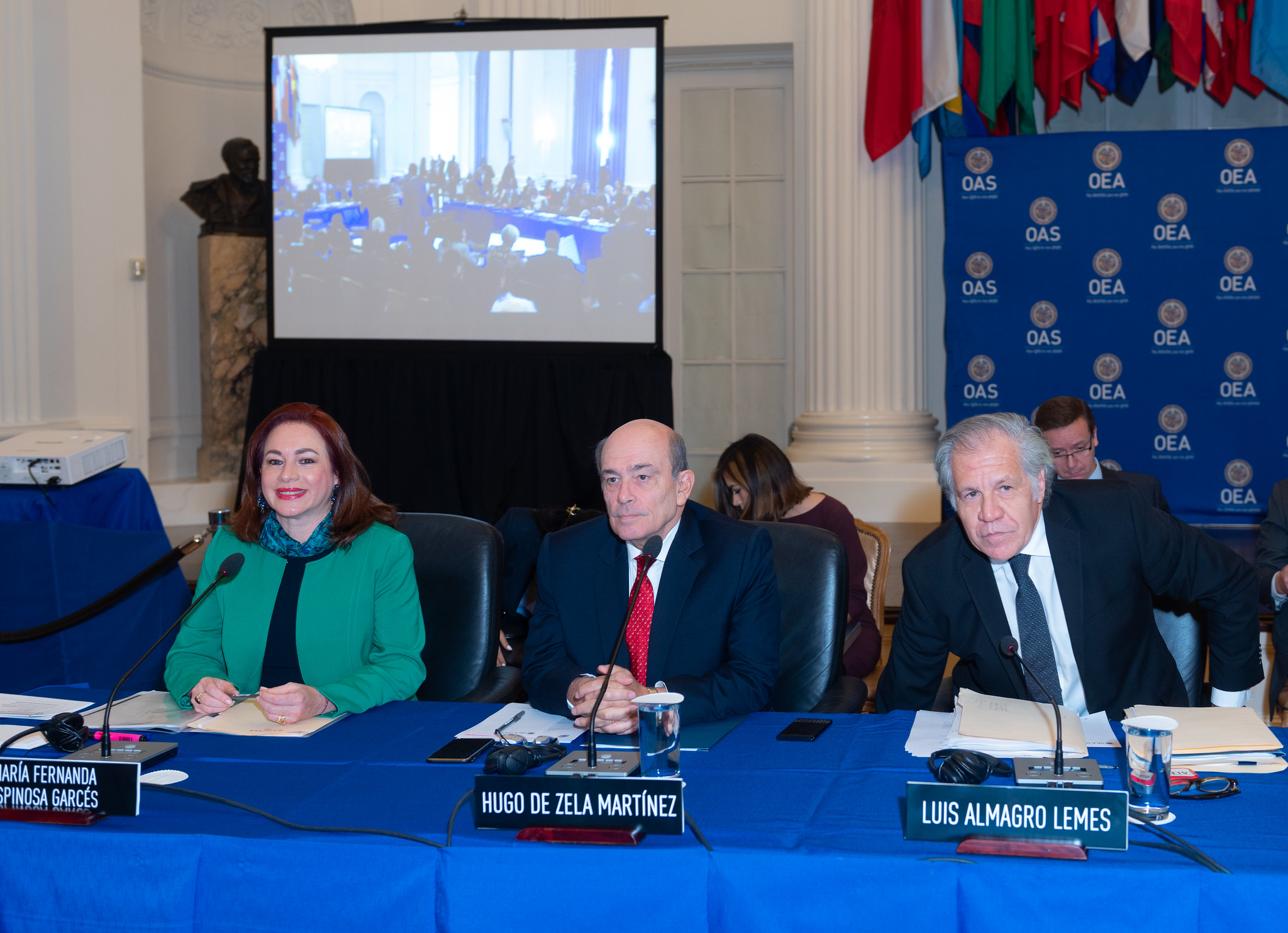When the 43rd General Assembly of the Organization of American States (OAS) released its final resolution on June 7, those waiting for a brave new direction on the war of drugs were likely disappointed.
For all the rhetoric of breaking taboos, decriminalization—at least of marijuana—proved to be a step too far for some participants. The writing was on the wall when the OAS failed to ratify a report they commissioned from a group of experts titled “The Drug Problem in the Americas,” which suggested that “the decriminalization of drug use should be considered on the basis of any public health strategy.”
OAS Secretary General José Miguel Insulza was careful to manage expectations before the member states assembled in La Antigua, Guatemala. “It will be a platform for discussion where you reach an agreement to see which agency will monitor the study,” said Insulza. “We cannot expect all countries to take exactly the same policy on drugs, as they have different problems. There are countries that are characterized by consumption, others by violence and some by traffic.”
John Kerry, the first U.S. secretary of state to attend an OAS General Assembly, addressed the difficult position of the U.S. on this issue. “I am critical of my own country because we have not done enough to reduce drug use,” said Kerry. “Nobody wants to see that our relationship is defined by law enforcement, security and narcotics.”
Kerry pointed out that in the last five years, the U.S. has seen a 40-45 percent drop in cocaine use, but admitted that more could be done. According to the OAS, U.S. drug users represent 45 percent of the world’s cocaine users, half of its heroin users and a quarter of its marijuana users. Though Kerry praised the OAS, the U.S. delegation, including Drug Czar Gil Kerlikowske, was strongly opposed to any mention of decriminalization in the final draft of the declaration. Beyond Drug Policy
Still, the drug problem was just one of many issues on the table at the General Assembly, including the financial state of the OAS, which is currently $4.8 million in debt and with dwindling cash reserves.
Potential splits in the OAS were also evident, with countries from the Alianza Bolivariana para los Pueblos de Nuestra América (Bolivarian Alliance for the Peoples of our America—ALBA) wishing to leave the Inter-American Defense Board (IADB). Representatives of Nicaragua, Venezuela, Bolivia, and Ecuador announced in a press conference that the split would become permanent in July, arguing that being part of the IADB “made no sense” for their respective countries.
Another source of regional discord was the debate surrounding the Falkland Islands/Las Malvinas. The islands were on the agenda again, with OAS member states broadly split between English-speaking countries that support the United Kingdom’s claim to the islands, and Spanish-speaking countries that support Argentina’s claim. The draft resolution urged Argentina and the United Kingdom to continue talking, but little progress was made on the issue of sovereignty.
Meanwhile, though Insulza said that “there was not much atmosphere” to discuss events in Venezuela, an Ecuadorian journalist ambushed Insulza at the opening press conference with questions about the country’s recent election.
During the election of three new members to the Inter-American Commission on Human Rights (IACHR), Venezuelan Foreign Minister Elías Jaua used the opportunity to launch an impassioned defense of his homeland. Jaua complained that the IACHR had repeatedly denounced Venezuela as one of the worst human rights offenders in the region in its annual report. He also debated recent charges of electoral fraud and violence during the April elections and issues lingering from the 1989 Caracazo protests. Jaua concluded his speech with a call for reform of the IACHR.
Chile, meanwhile, wanted footnotes on every page of proposed conventions on human rights and discrimination, and both Chile and Guatemala expressed concerns over resolutions on abortion and single-sex marriage. Chile said it was working on the issues domestically, while Guatemalan President Otto Pérez Molina said his country needed time to analyze the issues “due to concerns that arose between members of the churches and civil society.”
Future of the Drug Debate
With the slogan “Towards a comprehensive policy against the world drug problem in the Americas,” expectations of a policy breakthrough at the General Assembly were high. However, the General Assembly’s final declaration pushed back further discussion on drugs until 2016–2020, giving countries time to continue debating decriminalization and to see the effects of new liberal consumption policies.
But some countries don’t have the luxury to wait. As Honduran Foreign Minister Mireya Agüero said, “The price we are paying to be transit countries is unfair and intolerable. Our governments are overwhelmed.”
Guayana Foreign Minister Carolyn Rodrigues-Birkett laid out the situation in a series of startling figures. “For $650 one can buy one kilogram of cocaine paste, this can be made into two kilograms with the right chemicals and sold on the streets for $32,000,” said Rodrigues-Birkett. “Where drugs flow in one direction, arms and violence flow in the other.”
Overall, tens of thousands of murders across the Americas can be attributed to drugs on a year basis.
José Miguel Vivanco, executive director of Human Rights Watch, said that “Governments should define new policies that reduce the damage caused by drug use and, in turn, reverse the violence and abuse that have characterized the current policies.”
Meanwhile, some local governments are moving forward with their own policy decisions. The U.S. states of Colorado and Washington have already decriminalized the use of marijuana and 10 more states are looking into it. Uruguay has moved to legalize and regulate the distribution of marijuana. Argentina and Brazil have both considered making personal consumption a non-crime.
However, a continent-wide policy of decriminalization was never likely to be on this year’s agenda.
For President Pérez Molina, holding the General Assembly in La Antigua was a personal triumph, and getting Secretary Kerry to attend was also an important accomplishment. Perhaps best of all, Pérez Molina avoided the potential embarrassment of watching his support for drug legalization receive a cold shoulder from the majority of his neighbors.
The General Assembly also had a superb outcome for the United States, which avoided being demonized as the country that stopped progress in the war on drugs. Beyond drugs, the U.S. delegation left Guatemala with a few other victories: Stanford University professor James Cavallaro was elected to the IACHR and diplomatic links to Venezuela were re-established for the first time in years, following Venezuela’s release of U.S. documentary filmmaker Timothy Tracy.
On the final day of the General Assembly, police at Guatemala’s La Aurora International Airport captured Rubén Estuardo Tovar Ramírez, who was attempting to smuggle over $500,000 in a false luggage compartment as he was about to board a flight to Panama. The arrest showed why a consensus on drug policy is required to fight the violence and corruption that the war on drugs has failed to solve.
Such a policy may take until 2016–2020—or longer—to come to light, but three days in Guatemala may be remembered as the difficult beginning to a hemisphere-wide initiative. Who remains at its vanguard and in what direction is it taken remains to be seen.









